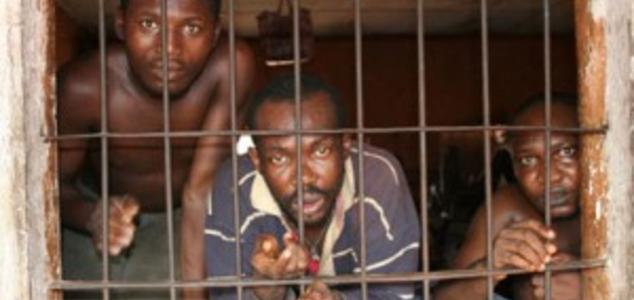Kirikiri evokes fear under grim conditions. The tough place hosts two prisons, one maximum, one minimum, where many inmates languish as awaiting trial for years.
Acting News Editor, ISHAYA IBRAHIM, reports how the judicial system makes things even worse and how prison officials cash in.
 Awaiting trial persons in Nigeria’s prison system are up against several hiccups that drag their cases endlessly. The police, judiciary, and prison system combine to make life brutish in various ways.
Awaiting trial persons in Nigeria’s prison system are up against several hiccups that drag their cases endlessly. The police, judiciary, and prison system combine to make life brutish in various ways.
There are 56,620 persons in prison in the country. Of this number, 17,586 (31 per cent) are serving time, while 39,034 (69 per cent) are awaiting trial; meaning, their cases are pending in court.
Many have spent decades awaiting trial due largely to shoddy investigation by the police, prolonged adjournments by judges, and failure of the prison authorities to produce inmates in court on hearing dates.
Prison authorities contribute to court adjournments
Wikipedia defines prison as “a facility in which individuals are forcibly confined and denied a variety of freedoms under the authority of the state as a form of punishment.”
Prison wardens, therefore, act as correction and administrative officers. Their duties include rehabilitating convicts and producing those awaiting trial in court on hearing dates.
But there are lapses by prison officials, especially in Lagos State, in producing awaiting trial persons in court; thereby adding to the delay in justice.
An inmate (name withheld) whose trial has lingered for four years, and who was to appear at the Ikeja High Court on March 24, got another extension of his case for one month because he was absent when the case was called at about 10.30am.
Justice Lateefat Okunnu asked for explanation. The counsel to the absentee defendant said it was a surprise to her because she had spoken to him the previous day at Kirikiri Medium Prison.
The judge adjourned the case and issued a fresh warrant to the prison authorities to produce him in court on the new date.
Officials exploit logistics constraints
The accused was eventually brought to court on March 24 when it was too late. The vehicle (Black Maria) which was to convey him that morning had developed fault. A quick repair was carried out. They reached the court at about 12pm when his case file had been closed.
But another problem was brewing for the detainee. The vehicle which brought him and other inmates to court broke down again. This time, it could not be fixed.
The warden made a quick arrangement for their transportation back to prison in the Black Maria of Kirikiri Maximum Prison. They were made to pay N200 each for the ride.
Shoddy police investigation prolongs trial
Another cause of delay for awaiting trial inmates is the shoddy investigation of the police, who, after failing to produce evidence against an accused, ask for lengthy adjournments.
Richard Johnson (not real name), an inmate at Kirikiri Medium Prison awaiting trial, received the usual news of adjournment at the Ikeja High Court on March 27.
The judge, as has been the tradition since the case started in 2010, announced a two-month adjournment to give the police more time to produce their witnesses in court, after failing to do so on several previous occasions.
Johnson’s troubles began in April 2010 when the bank he was working for (Bank PHB now Keystone Bank) in Akowonjo, Lagos was robbed on the night he was on duty.
His colleague was killed, but he escaped. The Special Anti-Robbery Squad (SARS) holds him as a suspect.
Five years on, the case has not moved beyond the hearing stage due mainly to the inability of the police to produce any witness.
In search of justice, Johnson’s elder brother, Noel, approached the Lagos office of the Public Defender (OPD) to intervene. He met a stone wall.
Noel left his base in Kaduna for Lagos in August 2011 to help his brother with the case and returned disappointed in December 2013.
He now hopes that Governor Babatunde Fashola will intervene to ensure that an innocent man does not suffer injustice.
Buying and selling
Buying and selling goes on at Kirikiri, as in the outside world. Food staples are sold and inmates cook their food because prison meal is either insufficient or below standard.
An inmate (name withheld) narrated that wardens act as traders in a bubbling market where inflation is high because of limited supply.
A cube of Maggi costs N10 instead of the ‘three for N20’ in the outside world. A pack of Indomie noodles that sells for N60 costs N100 in the prison.
Detained businessmen also transact businesses outside the walls using prison officials as middlemen.
Levy of inmates
Inmates at Kirikiri Minimum Prison complain of ill-treatment and extortion by the authorities.
Several inmates who spoke to TheNiche alleged that officials levy them for repair works and servicing of prison vehicles. They alleged that they were recently asked to contribute money for the purchase of tyres for a prison vehicle.
Cells in the Medium Prison are categorised into two – common and privileged.
Inmates of the common cell (for common suspects or criminals), which accommodates about 70 persons, were allegedly levied N5,000.
Inmates of the privileged cell (for politician and white collar crime suspects or convicts), which takes in 80 persons, were allegedly levied N50,000.
Inmates said several other extortions also take place. One recalled how prison officials allegedly made money from a protest against outgoing Prison Deputy Controller, Kayode Adeyemi, in October last year.
Adeyemi had assembled all the inmates to formally introduce his successor, Okocha, also a Deputy Controller. But the inmates turned wild in violent protest for hours against Adeyemi whom they accused of highhandedness.
Scores of inmates were seriously wounded, the office of the chief warder was looted and razed. An unconfirmed report said five inmates who escaped through the fence were killed.
After the violence, the inmates were allegedly asked to pay for the damages done to prison property and the treatment of those injured.
Another lengthy trial in Owerri
There is another case in Owerri involving Stephen Anoruo, who said he was set up by his debtor and has been in detention since 2008 because the courts refused to grant him bail.
According to him, his debtor, in order to keep him out of circulation because he did not want to pay his debt, lied to the police that he was among those who attempted to kidnap the wife of Frank Nneji, the Chief Executive Officer and Managing Director of Associated Bus Company (ABC).
The prosecution witness has since died and the judge who handled the case originally has retired.
TheNiche learnt that the case has neither a complainant nor a witness. No one showed up in court the last time it was mentioned before a new judge.
The defence lawyer, Nelson Umahi, abandoned the case because Anoruo’s family, after paying his initial legal fees, could not cope with his demand for more money.
Anoruo, who hails from Aboh Mbaise, is critically ill and his mother, a bed-ridden widow, is being asked by prison officials to pay the bill at the Federal Medical Centre (FMC), Owerri.
Johnson and Anoruo are two of the 39,034 prisoners awaiting trial and who represent about 70 per cent of the total prison population in Nigeria.
Shortage of judges
Anoruo’s case is further complicated by the shortage of judges in state and federal courts.
The few judges available in Imo deal with loads of cases while many accused persons are not assigned judges.
The Federal High Court in Lagos is reportedly in deficit of 40 judges.
Attempts by Federal High Court Chief Judge, Ibrahim Auta, to get the National Judicial Council (NJC) to approve the recruitment of more judges for the state are stalled by shortage of funds.
A shortage of judges worsens the situation of awaiting trial persons.
Prison officials fail to respond
Attempts to get Nigerian Prison Service (NPS) officials to react were not successful. When TheNiche called NPS spokesman Ope Fatinikun on the telephone, he said he was no longer the spokesman but declined to provide the contact of his successor.
High crime rate, lowest per capita prison population
Former Prisons Controller General, Zakari Ibrahim, declared in a lecture in Ado-Ekiti in 2014 that “where a person is in prison unconvicted, that person is deemed innocent until proven guilty.”
Major Hamza Al-Mustapha was kept in detention from October 1998 until his death conviction was upturned at the Appeal Court on July 12, 2013.
Many have gone through such experience; which a sociologist and security consultant, Ebongabasi Ekpe-Juda, blamed on a faulty justice system.
“A person is arrested for pick pocketing and it takes the court four, five years to convict while he languishes in prison as awaiting trial. The annoying part is that prison is supposed to be a reformative place,” he added.
He said when a man stays in prison for long for a minor crime that should attract less than three months’ sentence, he learns other dangerous things and comes out a hardened criminal.
With a population of 170 million, Nigeria has 56,620 persons in jail. Of this number, 17,586 are convicted and serving time, 39,034 are awaiting trial.
At face value, the figure suggests that crime density in Switzerland, which has a population of eight million and 10,000 people in jail, is higher than Nigeria.
But experts argued that there are fewer people in jail in Nigeria due to corrupt and incompetent policing and inefficient criminal justice system.
“With a population of 167 million, locking 50,000 people in custody makes Nigeria the lowest per capita prison population in the world. And what this means is that Nigeria has the lowest crime rate in the world,” Ibrahim said.
“But you and I know that the reason we have this low number of prisoners, with many of them awaiting trial, is that Nigeria has a very weak, decadent criminal justice system.”
Abakaliki as case study
Using Abakaliki Prison as a case study, a research by C. Ndukwe on the prison service and the challenges of social welfare administration found out that the Nigerian prison system is below the acceptable standard.
“The study discovered that Abakaliki Prison has been unable to meet minimum UN (United Nations) standard in welfare services because of congestion. There is a continuous use of bucket latrines which expose inmates to health hazards.
“Apart from inadequate funds, it was discovered that the mismanagement of welfare funds has exposed inmates to an unhealthy situation, which can result in epidemics and untimely deaths.
“We, therefore, recommend that the government should build more structures in the prison to accommodate the ever increasing number of inmates, state governments should be allowed to create state detention centres as alternative to prisons, and constant training and retraining of prison staff in line with current global best practices,” Ndukwe said in the research.
















